UPDATE: On Johns Hopkins Medicine’s Health website, Emma Slattery has listed the benefits of ginger, writing:
“Ginger is fantastic,” says Slattery. “It’s not just delicious. Gingerol, a natural component of ginger root, benefits gastrointestinal motility ― the rate at which food exits the stomach and continues along the digestive process. Eating ginger encourages efficient digestion, so food doesn’t linger as long in the gut.”
- Nausea relief. Encouraging stomach emptying can relieve the discomforts of nausea due to:
- Chemotherapy. Slattery, who works with patients receiving chemo for cancer, says ginger may take the edge off post-treatment nausea, and without some of the side effects of anti-nausea medications.
- Pregnancy. For generations, women have praised the power of ginger to ease “morning sickness” and other queasiness associated with pregnancy. “Even the American Academy of Obstetrics and Gynecology mentions ginger as an acceptable nonpharmaceutical remedy for nausea and vomiting,” Slattery says.
- Bloating and gas. Eating ginger can cut down on fermentation, constipation and other causes of bloating and intestinal gas.
- Wear and tear on cells. Ginger contains antioxidants. These molecules help manage free radicals, which are compounds that can damage cells when their numbers grow too high.
- Is ginger anti-inflammatory? It is possible. Slattery notes, “Ginger contains over 400 natural compounds, and some of these are anti-inflammatory. More studies will help us determine if eating ginger has any impact on conditions such as rheumatoid arthritis or respiratory inflammation.”
Originally posted December 14, 2016.
There’s one good reason grandmothers and mothers gave ginger ale to their children for upset tummies. It works. Gingerol, which gives ginger ale its delicious taste, helps prevent nausea and vomiting. But that’s not the only thing ginger alleviates.
Ginger contains 12 antioxidant compounds, and it is antioxidants that combat free radicals in your body. A type of antioxidant found in ginger, flavonolds, is especially good for your heart, reports Dr. Al Sears on a study comprising 1,400 men. Men who had the least amount of flavonoids also had the “worst carotid artery diameter and the highest risk of heart disease.” Ginger reduces oxidation, which can inflame the lining of arteries.
In one study, researchers divided 40 participants into two groups. Half were healthy. The other half had a history of coronary artery disease. One group received 5 grams of ginger powder each day, and the other received a placebo. After four weeks, oxidation had decreased by 18% in the healthy group and 23% in those with a history of heart disease.
Like aspirin, ginger works as a blood thinner. And that means it prevents clots from forming that could lead to heart attack or stroke.
Studies also show that ginger has anti-inflammatory properties. It works the same way aspirin does, by blocking COX-2 — the enzyme that promotes inflammation. And inflammation is the leading cause of heart disease and other chronic illnesses.
Most health food stores sell ginger supplements. The key is to buy supplements containing 5% gingerols. A ginger capsule of 100 mg per day is a recommended place to start. But a word of caution: pregnant women are advised to take ginger for nausea (no harm to the fetus), but ginger has a blood thinning effect. Taking aspirin or Coumadin might not be a good combo with ginger.
But for most of us, fresh ginger root is a tasty addition in the kitchen, and ginger tea is especially easy to make.
- Boil 4 cups of water in a saucepan.
- Peel a 2-inch piece of fresh ginger root and slice it into thin slices.
- Add the ginger to the boiling water.
- Cover it, reduce the heat, and simmer for 15-20 minutes.
- Strain tea. Add honey and lemon to taste.
Jonny Bowden reports that ginger also improves circulation and helps boost the immune system. Pictured above is a huge bowel of ginger that was on display at the yoga studio Dick and I attend. Shakti Yoga (Key West) uses mega amounts of ginger in its café’s various delicious and healthy drinks. Bottoms up and namaste.
Seven spices that can save your life – Jonny Bowden PhD, CNS, (aka “The Nutrition Myth Buster”)
If you’re willing to fight for Main Street America, click here to sign up for the Richardcyoung.com free weekly email.






